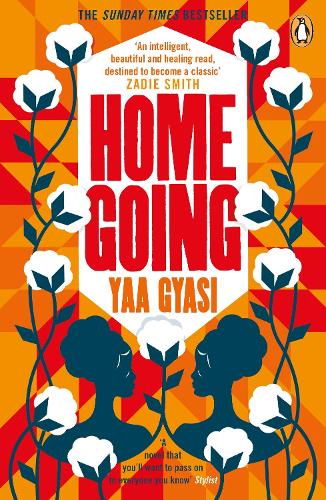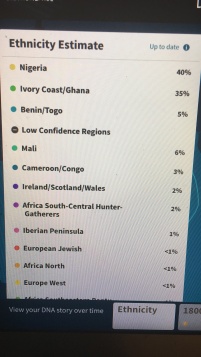In February 2018 a friend of mine sent me a book to read, claiming that it will change life as I know it. I was sceptical, obviously, like what book could have such an impact on me and in what capacity? The book was ‘Homegoing‘ by Yaa Gyasi, a 29 year old Ghanaian-American novelist.
The story takes you on a fast-paced journey throughout slavery and colonisation simultaneously, beginning with a woman who has two daughters, one of which ends up on a slave ship and the other remaining in Ghana. Each chapter follows the sisters’ descendants, generation by generation, concluding in the present day. It beautifully and painfully illustrates how easy it was to lose one’s culture, family, and self. 
After being on that emotional roller-coaster (and convincing my family and close friends to also read the book) I decided to do a DNA test. Being of Jamaican heritage, the furthest I knew back to was my great great grandparents who were born in Jamaica just after slavery ended. Being Black and from the Caribbean you just assume that your ancestral line originates from somewhere in West Africa (probably Ghana if you’re from Jamaica) with a bit of British in you (considering the known nature of slavery). But you never really know until you spit in that tube.
Upon researching into DNA history, I found that people tend to take one of two tests:
AncestryDNA: This test provides an overview of the origins within your blood with a timeline based on when the various countries were introduced. It provides more accurate locations that 23&Me (which can sometime give regional data rather than country specific). It also has a stronger database set up for historical purposes which allows you to create your own family tree and find documents such as birth, death, and marriage certificates.
23&Me: This test is more scientific focused but also provides you with an overview of where your blood originates from with a timeline indicating when different origins were introduced. If you are a man it will also tell you your maternal and paternal ancestry, dating back to biblical days (for women it will only provide your maternal lineage due to the Y chromosome). Its health reports can tell you information about traits, (such as if you’re likely to have dimples or curly hair), wellness (how well you metabolise caffeine and if you’re a sprinter), as well reports on carrier status.
Both tests give you the option of discovering and connecting with people who are related to you, providing a description of whether you are first/second/third cousins (etc).

My own results shocked me to my core. A whole 40% Nigerian… 40%! Based off of the timeline and data it seems like the majority of my ancestors came over to the caribbean at the end of slavery (1800s). The results also dismantled some family theories such as thinking that there is native American blood in our line, while bringing other truths to light such as the presence of Jewish and Polynesian blood (like how did anyone close to Australia find there way into my bloodline?)
It was truly an eye-opener and a conversation starter within my family, making me take a double check whenever I looked in a mirror for a while. I perceive such science as a true gift to our generation. For the first time since we were taken from our homelands, we are able to find out where we truly come from.
I would encourage everyone to consider embarking on this journey whether you believe you know the full extent of your ancestral background or not. Many of us have bits of our stories which are unknown. I believe that the exploration of these untold stories has the power to breakdown stereotypes and misconceptions people may carry about other West Indians to explore their ancestral past and to discover who they were and where they came from before the humanitarian tragedy that is slavery. That is not where your story begins.
@CillaHope_
TheMoveHub.com

